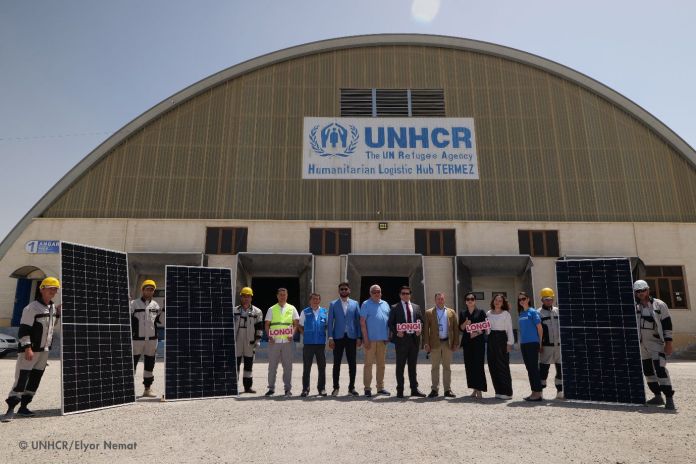UNHCR, the UN Refugee Agency, and LONGi Green Energy Technology Co Ltd. launched phase one of a joint climate action and solar energy project that seeks to transform UNHCR emergency and preparedness stockpiles into solarised facilities.
The UNHCR Regional Humanitarian Logistics Hub, located within the Termez Cargo Centre in Surkhandarya region of Uzbekistan, is the first facility to be equipped with LONGi renewable energy equipment, including a 700KW solar photovoltaic powerplant. Representatives of the Government of Uzbekistan, local authorities, LONGi and the United Nations attended the ceremony.
“LONGi is honoured to partner with UNHCR and to be here today to witness the kick-off of this important project,” said Zoe Gao, LONGi MEA&CA Regional Marketing Manager. “This partnership highlights LONGi’s commitment to supporting sustainable development and energy equity, especially for people who have been forced to flee their homes.”
Located on the border with Afghanistan, Surkhandarya region increasingly experiences the consequences of climate change, with frequent dust storms and droughts, which significantly impact the socio-economic development of the region and the well-being of its residents. It is also the region which hosts the largest number of forcibly displaced Afghan citizens in Uzbekistan.
“We’re proud to embark on this transformative journey with LONGi towards a future where sustainable energy is not just an ideal, but a reality for all,” said Dumitru Lipcanu, UNHCR Representative for Central Asia, a.i. “With the use of this safe and green energy, we hope to lessen our impact on the environment, and work together towards a sustainable, green future for all, including forcibly displaced people and the communities generously hosting them.”
LONGi and UNHCR signed a global partnership agreement in December 2023 comprising Climate Action, Energy Equity, and Green Transformation projects, initially implemented in Uzbekistan and Pakistan.
A complementary phase of the project in Uzbekistan will see 700 Afghan citizens and vulnerable members of the host community engaged in the establishment of windbreaks by planting trees and pasture plants in selected areas of Surkhandarya region. In line with the Government of Uzbekistan’s ‘Yashil Makon’ project – launched in 2021 with the aim of planting 200 million trees each year – the initiative aims to boost income generation and employment opportunities for participants, promoting self-reliance, peace and stability.
Related
- SEO Powered Content & PR Distribution. Get Amplified Today.
- PlatoData.Network Vertical Generative Ai. Empower Yourself. Access Here.
- PlatoAiStream. Web3 Intelligence. Knowledge Amplified. Access Here.
- PlatoESG. Carbon, CleanTech, Energy, Environment, Solar, Waste Management. Access Here.
- PlatoHealth. Biotech and Clinical Trials Intelligence. Access Here.
- Source: https://solarquarter.com/2024/06/11/solarising-the-unhcr-emergency-stockpile-in-uzbekistan/



